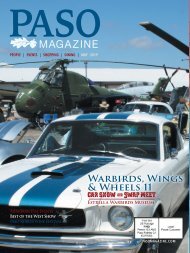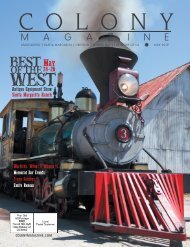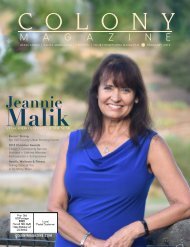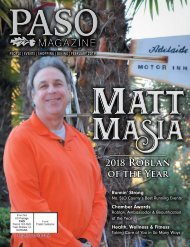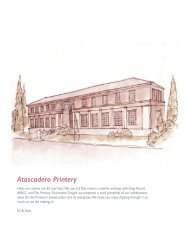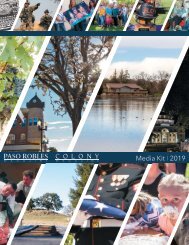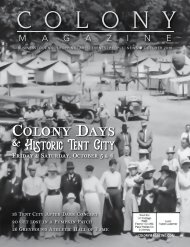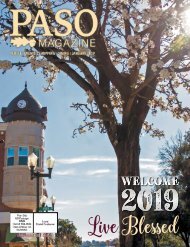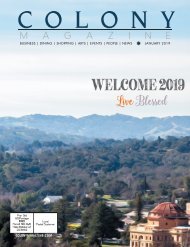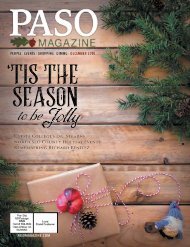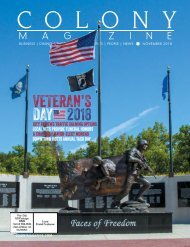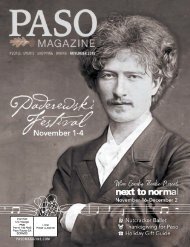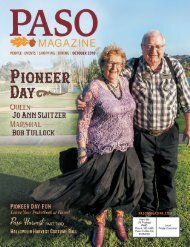2017 November PASO Magazine
The Story of Us — PASO Magazine takes a monthly look at our remarkable community.
The Story of Us — PASO Magazine takes a monthly look at our remarkable community.
Create successful ePaper yourself
Turn your PDF publications into a flip-book with our unique Google optimized e-Paper software.
Beyond waving flags, salutes and parades are the very real sacrifices of war. Two men from two different<br />
generations and wars in Vietnam and Afghanistan describe briefly their post-combat experiences.<br />
Chip Wilbury trained deploying soldiers how to render first aid, but felt his<br />
work would not be complete as a combat medic until he himself had seen battle,<br />
so off he went — numerous times — and managed to return home safely.<br />
“I have a recurring dream based on a real-life occurrence in Afghanistan —<br />
Matun Hill in Khost, 8 kilometers from Pakistan. I was the staff sergeant senior medic<br />
with the 870 th MP’s from Pittsburg, California. This was my fifth deployment as a<br />
medic, my third deployment into combat from 2010 to 2011.<br />
“The air raid sirens sound off in the middle of my very light, and sometimes<br />
troubled, sleep. Mortar rounds are coming in from outside our base, probably from<br />
the nearby hills. We can hear one or two whistles overhead as they pass. I’m thinking<br />
to myself, ‘We’ve trained this scenario dozens of times in training back in the<br />
US base, but we’re always surprised when it happens for real.’<br />
CHIP WILBURY IN KHOST AFGHANISTAN “The mortar rounds are not near us as they land, but close enough to be feel the<br />
thump as the rounds hit earth. We hear what sounds like to us tiny rain drops hitting<br />
the top and the sides of the concrete and cinder blocks. The old cliché that ‘there are no atheists in fox holes sometimes rings true.’<br />
“Most of these soldiers are on their first deployment. Many are away from home for the first time. Most have families waiting for their<br />
return home. Everyone that I spoke to in these situations are very proud to serve in the military and to serve the U.S. government.<br />
“These young soldiers I speak with are just as patriotic as their family members that have preceded them. Maybe more so. I have<br />
been so very impressed with the younger people that I have served with in my deployments, that I’m confident our nation will be<br />
protected and served well by this next generation.”<br />
Joaquin Martinez, born in Mexico, struggled to become an American<br />
citizen like his mother, who was born in Albuquerque. When he registered<br />
for the Selective Service during the Vietnam Conflict, Joaquin’s father<br />
told him, “If the draft gets you, face your destiny.”<br />
His friends pleaded, “Don’t go. It is not your war. Mexico is not in the<br />
war.” But he listened to his father’s words and ignored everyone else.<br />
“When you are a truck driver and the convoy is hit by the enemy, you<br />
get out of the killing zone,” said Joaquin. “But if you’re in a gun truck,<br />
you go into the killing zone, engage the enemy, protect other drivers and<br />
the equipment. After the fight stops, evacuate the wounded and pick up<br />
the dead ones, friend or enemy. Never leave anyone behind.<br />
“I did it for my new country, the country of my parents.<br />
Today, I can wear my medals with pride.”<br />
Upon returning home, he married his girlfriend Silvia after asking her<br />
parents for their daughter’s hand in marriage. He felt proud to wear his<br />
Class A uniform at their church wedding on Christmas Day, 1971.<br />
While trying to adjust into the civilian life, Joaquin learned to stay quiet<br />
about the war because people made him feel like traitor. They called him<br />
“rapist” and a “baby killer,” when neither was true.<br />
He said he killed only the enemy that tried to kill him. When Joaquin<br />
met a man, who learned he was a veteran, he told Joaquin, “You should<br />
have been killed by the enemy you (expletive).”<br />
Joaquin worked at McDonnell-Douglas in Long Beach as a liaison<br />
engineer. He retired in 1993 and moved to Mexico, where he felt<br />
more like a hero. After being diagnosed with PTSD and diabetes, he<br />
returned to the United States, where he resides with his wife of 45 years in<br />
Alhambra, California.<br />
“For 40 years, my deployment was a date of shame and sadness. About<br />
four years ago, I started to feel proud of what I did. I did it for my new country,<br />
the country of my parents. Today, I can wear my medals with pride.”<br />
JOAQUIN HOLDING UP HIS HAND WITH A GESTURE AS IN “A LITTLE<br />
BIT” — THE AMOUNT OF TIME HE HAD LEFT IN VIETNAM. THE ARMY CUT<br />
HIM LOOSE JUST A FEW DAYS LATER AND HE GOT TO GO HOME!<br />
PHOTO CREDIT: RICK EVANS<br />
JOAQUIN, 25, AND HIS WIFE<br />
SYLVIA ON THEIR WEDDING<br />
DAY 45 YEARS AGO.<br />
24 <strong>PASO</strong> <strong>Magazine</strong>, <strong>November</strong> <strong>2017</strong>





